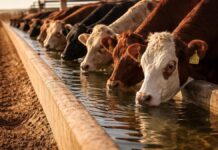Investing in small-scale agriculture and local food systems is one of the most impactful ways of tackling malnutrition and food insecurity, bringing lasting benefits to national economies. This is the message Alvaro Lario, President of the UN’s International Fund for Agricultural Development (IFAD), will take to the Nutrition for Growth (N4G) Summit that will bring global leaders and the world’s nutrition experts together in Paris on 27-28 March 2025.
“Smallholder farms are the roots that sustain global nutrition. Investing so they thrive is not just about feeding people today – it’s also about long-lasting solutions that build resilient and equitable food chains that can feed the world for generations to come,” said Lario in advance of the summit.
At the Summit, Lario will emphasize that combating malnutrition requires more than just increasing agricultural productivity – especially in regions like sub-Saharan Africa, where yields remain low. It also means supporting the production of a wider variety of local, nutritious, and climate-resilient foods. Of the planet’s 5,000 food plant species, people mostly eat only nine, of which just three – rice, wheat and maize – provide 50 per cent of all calories. Hundreds of local and neglected foods exist which are nutritious and resilient to local climate conditions. They include for example, millet, sorghum, several types of beans, fruits, and vegetables.
Along with improvements and greater diversity in production, these foods must be available in appealing, accessible options and reach local markets and supermarkets through efficient and inclusive value chains, ensuring that people not only have access to but can also afford diverse and nourishing diets. Hence the crucial need to invest in the millions of rural Small- and Medium-Sized Enterprises (SMEs) – often informal – that form the backbone of food value chains in developing countries, but remain critically underfunded.
Lastly urgent investments are also needed to support small-scale farmers adapt to growing climate shocks which put food and nutrition security at risk. Small-scale farmers grow one third of the world’s food and up to 70 per cent of the food consumed in many low- and middle-income countries, but receive less than 1 per cent of global climate finance.
“Investments in nutrition and food systems provide extraordinary social and economic returns, driving inclusive growth across countries and generations. That’s why we must scale up existing and emerging financial instruments that enable both public and private sector actors to invest at the level needed,” said Lario.
Latest estimates show that each US$1 invested in addressing undernutrition can generate an expected return of US$23. Also, economic growth in agriculture is two to three times more effective at reducing poverty and hunger than growth generated in other sectors.
Yet, current investments are far from adequate to address the scale of the global nutrition crisis. According to estimates, average government spending on addressing ‘nutritional deficiencies’ is just US$1.87 per person—making it the lowest expenditure among all disease categories tracked in global health spending. In addition, malnutrition is estimated to cost the global economy US$3.5 trillion annually in lost productivity, healthcare costs, and diminished human capital. In Africa, child undernutrition and malnutrition are responsible for economic losses ranging from 1.9 per cent to 16 per cent of Gross Domestic Product (GDP) each year.
At the summit, Lario will advocate for more blended finance mechanisms that allow the public sector, private investors and philanthropies to pool their resources and share risks, innovative credit tools, nutrition bonds and the leverage of remittances and diaspora investments.
IFAD is also committed to scale-up its nutrition action, with at least 60 per cent of its projects integrating activities that support better nutrition, such as agroecology, family gardens, school feeding programmes that source nutritious foods from local farmers, support to grow and market neglected and underutilized food species, and better storage to avoid food loss. Investing in agrobiodiversity helps build healthier and more resilient food systems.
Today, 2.8 billion people – one out of three — cannot afford a healthy diet. About 148 million children – almost one-in-four children – are stunted as the result of chronic or recurrent undernutrition, preventing them from reaching their physical and cognitive potential. About 45 million children are wasted, a very immediate and life-threatening form of malnutrition, often indicating a recent and severe weight loss. Over 2 billion people are estimated to suffer from deficiencies in essential vitamins and minerals, such as iron, vitamin A, and zinc. About 390 million children and teens are overweight or obese.
More about IFAD nutrition investments
An investment in agriculture is an investment in nutrition
Integrating nutrition into IFAD projects in the Pacific
Neglected and underutilized species are key to feed the world
IFAD partners with Zenkyoren to issue its first nutrition bond








